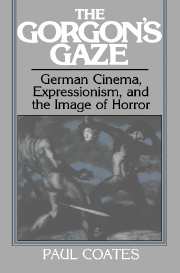Book contents
- Frontmatter
- Contents
- Preface
- Acknowledgments
- Introduction: The uncanny and the gorgon's gaze
- I Silent cinema and expressionism
- II The sleep of reason: Monstrosity and disavowal
- III Memory and repression in recent German cinema
- IV Expressionism in America
- V Elective affinities and family resemblances: For Margarethe von Trotta
- Appendixes
- Notes
- Selected bibliography
- Filmography
- Index
I - Silent cinema and expressionism
Published online by Cambridge University Press: 21 October 2009
- Frontmatter
- Contents
- Preface
- Acknowledgments
- Introduction: The uncanny and the gorgon's gaze
- I Silent cinema and expressionism
- II The sleep of reason: Monstrosity and disavowal
- III Memory and repression in recent German cinema
- IV Expressionism in America
- V Elective affinities and family resemblances: For Margarethe von Trotta
- Appendixes
- Notes
- Selected bibliography
- Filmography
- Index
Summary
Realism, totalitarianism, and the death of silent cinema
The received accounts of the development of the arts during the past 150 years speak of a movement from realism to modernism, and thence to postmodernism. This schema is often extrapolated to the history of cinema, which is said to replicate, in speeded-up, time-lapse form, the history of the other arts. The model implies a history that proceeds in dialectical fashion, with the inherent shortcomings of one form calling forth another to correct it and that a successor, and so on. Each stage constitutes an organic response to – an answer to the lack in – the preceding one. But what if this is not the case in cinema? What if one is dealing with mechanism rather than organism, with a history that has been dictated by violence rather than anything even vaguely resembling necessity? Thus sound cinema is not the answer to silent cinema; it is qualitatively different from it. Silent cinema does not die a graceful, biologically ordained death but is destroyed by a catastrophe. The same applies to monochrome in the sixties. It seems to me, moreover, that cinema does not begin with realism but with modernism, with an alienation of our everyday experience of reality that is then dispelled by the coming of sound, with its enhancement of realism – sound's advent being part of the international fascist and socialist realist backlash against modernism. (A backlash is less a necessary response than a counterrevolution.)
- Type
- Chapter
- Information
- The Gorgon's GazeGerman Cinema, Expressionism, and the Image of Horror, pp. 18 - 73Publisher: Cambridge University PressPrint publication year: 1991



